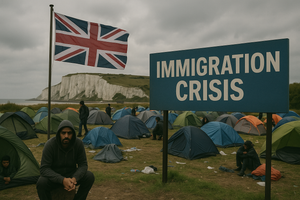There is an old saying that we travel to learn how ignorant we are. We move through life at home with the false confidence of familiarity. But to travel is to explode that ease. And it's paradoxical: we set out to expand our knowledge, only to discover the vastness of what we don’t know.
Perhaps this is an extreme version of what truly takes place, particularly in the modern world, with international news flooding the planet. Reports of events and developments from a distance become much more real and understandable when you travel where they are happening.
I’m on a short stay in London at the moment, and like everyone around the world, I’m vaguely aware of “the immigration issue" in Europe. But what I didn’t realise was how extraordinary, how extreme, and incredibly ironic it all is.
European countries all have their own “immigration issues”, but what’s surprising is how different they all are. In Germany, it's an old issue, with hundreds of thousands of mainly Turkish “guest workers” entering the country from as far back as the 1960s. Those immigrants, almost a million of them, are now pretty well integrated, partly because Germany's economic growth between the 1970s and 2000s was able to absorb them comparatively easily.
The comparative success of that program gave the German political elite confidence it could carry this forward into a second wave, resulting in then-chancellor Angela Merkel’s bold (and arguably misguided) statement in 2015 that the country could admit over a million refugees. The political elite saw immigration as vital to fill labour shortages in a rapidly ageing society.
That confidence has now evaporated.
In France, the new immigration wave is coming mainly from former North African colonies. Likewise, in Spain, from Central and Latin America, for largely the same reasons, political trauma is enough to send hordes of people northwards. But are they political refugees, or economic refugees? Is there actually any difference? Italy, a short distance from North Africa, serves as a major transition point. Eastern Europe has the wars in the Middle East to contend with. The consequences of immigration are being felt everywhere in Europe now, and the political ramifications are tearing the political consensus of the past fifty years to pieces, as it has in the US.
Though the circumstances might change, politics is taking roughly the same trajectory everywhere in Europe, even if the reasons and style of immigration differ. Political elites from established parties are not pro-emigration - they often speak out against it. But clearly, neither are they vociferously against it. There is an economic argument that emigrants ultimately boost a society’s economy. Some of the great economic successes of our age, Australia, Canada, and most importantly, the US, were founded on precisely that idea: immigrants come to seek a better life, invigorate society, fill labour shortages, bring new skills, and so on. This is all very familiar to the educated elites.
But not so much for people struggling, or who feel themselves to be struggling, in their own countries. Immigrants tend to deflate wages, which is precisely why they are popular among corporate elites. They bring new skills, but sometimes also new prejudices and beliefs and religions. However, this is a different kind of immigration than the immigration that founded the industrial revolutions in the US and Australia. The current wave of immigrants is often more about personal safety than about finding the land of financial hope and glory. The economic benefit theory of immigration is being challenged because, largely, these are not immigrants looking to arrive but immigrants dying (sometimes literally) to leave. They are not trying to “start a new life”. They are push-motivated, rather than pull-motivated, you could say.
And there is another problem: many immigrants are coming from Muslim countries and are consequently people with very developed and settled religious beliefs, which can complicate integration. That’s partly true of all immigrants at all times in history, but the research does show that isolated communities are more easily radicalised. I think and hope Muslim immigrants to Europe will integrate, but the research shows the process is much slower and more contested than for some other groups — partly because of cultural/religious visibility, partly because of discrimination, and partly because of political weaponisation of the issue.
Often, opposition to immigration is seen as “populist” by elites, even racist. Calling people who oppose immigration “racists” may or may not be true, but it definitely serves to underline the cultural and political cleavage between elites and “populists”. But this is not populism in a strict sense. Anti-immigrant sentiment is about “outsiders”; it's more specific in character. Populism is mostly about “insiders”: elites, technocrats, Brussels bureaucrats, Washington swamp-dwellers, bankers, the “mainstream media” - that sort of thing. But combined, nationalism and populism form a powerful political force, as we have seen now all over Europe.
This brings us to the United Kingdom, specifically London, and irony. The UK famously left the European Union partly due to concerns that European countries were not taking their immigration issues seriously enough. The very close vote was arguably tipped by a growing anti-immigration sentiment.
But I learnt only this week that something incredible has happened after Brexit: legal immigration has exploded in the UK and illegal immigration has continued apace, partly through light boats rushing across the English Channel from France. The numbers are just mindboggling. Net migration before Brexit was around 200,000 people per year, mostly Europeans who entered the UK as part of the EU’s open borders policy. An issue, but not a train smash in a population of 65 million people, surely? It's now running at around 600,000 a year. I am not making this up. How on earth did that happen?
The Wall Street Journal this week explained the issue in all its weird glory.
The fault lies with a new experiment introduced by the Conservative Party of Boris Johnson, who “slammed the door on European immigration only to open it to the rest of the world”. The idea was to goose a sluggish economy by attracting the planet’s best and brightest people. In this sense, informed Brits tell me, Johnson was often misread as a kind of closet racist, campaigning in favour of Brexit because of an aversion to “foreigners”. But Johnson himself has Turkish roots, and he wasn’t opposed to other foreign nationals entering Britain as long as they were “needed”.
So he devised a new scheme where businesses could apply for the right to authorise the emigration of people who were allowed to work only in that profession. The Tories, despite repeatedly promising lower overall immigration levels, soon lost control of the system they had designed, triggering the biggest influx of legal migration the country has ever seen, the Wall Street Journal reports. “In just one job field, care aides who look after the infirm or elderly, one government forecast assumed some 6,000 migrants a year would come to work. In the space of four years, 679,900 carers and their families arrived, government figures show,” the Journal reports.
The economic consequences, far from boosting the economy, are having the opposite effect: putting pressure on already stretched public services such as health and housing. The result is that the two-party system that has dominated British politics for over a century has now completely broken down.
Four years ago, Nigel Farage, the theatrically blokeish pub politician, left politics convinced that his party, Reform UK, had achieved all it could. But now, he is back and winning. Yes, winning. Farage is on track to become the next UK prime minister. I am not making this up either. Reform is running ten points ahead of the ruling Labour Party, double the lead of the Conservatives!
Colourfully, the Wall Street Journal tracked down a former South African immigrant, Michael Groves, who runs a wellness business from Margaret Thatcher’s childhood home. He is a lifelong Tory who has just switched support to Reform. It's not about the “Little Englander” mentality, as it is often portrayed, or racism, he says. “Who stands up for the person who says immigration is bad for me?” The concern about an immigrant worried about immigration might seem crazy, but it is one of the more unpleasant aspects of immigration: once you are in, you really want to close the door behind you.
I remember some time ago writing a sour editorial for Business Day criticising the Australian government for treating illegal immigrants brutally. The Australian embassy in SA was furious, but when tempers calmed, a senior member of the Australian High Commission took me aside for a make-up lunch. He pointed out something I hadn’t thought of about immigration, and that is the huge business opportunities that underlie illegal immigration.
The system fosters a desperate buyer, looking at it from the perspective of the “immigration facilitator”, and desperate buyers are easy to exploit. It can generate powerhouse profitability, which is why the Mexican drug cartels are involved in the business. For governments of the target country, the only real response is to be absolutely ruthless about attempts to gain entry illegally, which should effectively close the door on that option for the emigrants.
So how will this all play out? I would love to say, not as badly as people assume. On this trip, I joined the Notting Hill Carnival, the second largest public carnival in the world, and an enormous celebration of Caribbean and African culture. Over three days, around two million people throng the streets of the very fashionable suburb in north-west London, eating jerk chicken, drinking beer, smoking joints, and dancing behind moving “sound systems”. It's a joy.
But it is hard not to notice that thousands of homes and shops were not only closed and locked, but actually boarded up. Publicly, Londoners accept the carnival with good grace. Privately, not so much.💥
From the department that demonstrates the need for an occasional sanity check ...

From the department of very necessary social distancing ..

From the department of sensible life ...

Thanks for reading - please do share if you have a friend (or enemy!) you think would value this blog and ask them to add their email in the block below - it's free for the time being. If the sign-up link doesn't appear, you'll find it on the site.
Till next time. 💥





Join the conversation